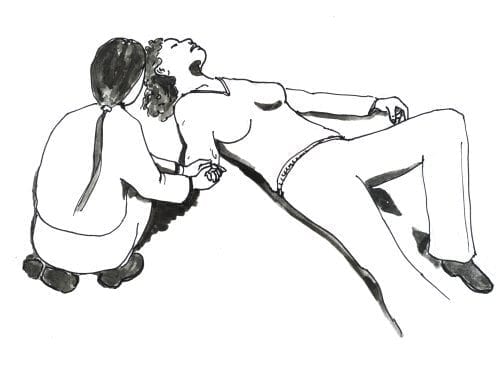Michelle Ponder
Philadelphia, Pennsylvania, United States
 |
| Approaching the patient: the rescuer comes in front of the patient, introduces herself, and asks the patient to squeeze her hand, in case she would be too weak to speak. Rama, December 2004. |
In my first year of clinical rotation in medical school there was no service as diverse as Psychosomatic Psychiatry. As a third year student I would run between consults; from a schizophrenic patient who believed he worked for Homeland Security, to a patient with several gunshot wounds and now likely had post-traumatic stress disorder Every new patient was another Pandora’s box, waiting to be opened. I never knew what question would unearth a goldmine of information or a landslide of tears. I was digging for treasure and stepping over landmines all at once. Somehow, against all of my earlier assumptions, I loved it. I loved hearing about my patients’ lives and getting the chance to know them.
One late Friday afternoon, we received a consult for a quadriplegic patient who was refusing the chest physical therapy necessary to improve his breathing. The primary medical team wanted us to evaluate whether he had the capacity to refuse, but on seeing the patient we found he had a tracheostomy and could only communicate by mouthing words, becoming more and more frustrated when asked to re-mouth his words again and again. It took over an hour to get just a few sentences of information, namely that he wanted to go home, where he had twenty-four hour care. But as his lungs were in bad shape, the medical team wanted him to heal a bit more before being released. It seemed to be a case of miscommunication, as the patient did not seem to be aware of the severity of disease and that he would be going home with the tracheostomy intact.
Over the next few days, I saw the patient from time to time. It was always difficult to communicate with him, as he had to choose his words very carefully and anything extra would cost him minutes of effort and time. There was not much for the psychiatry team to do—we mostly acted as a liaison between the patient and the primary team, who had much less time to spend talking to him. But I could help him change the channel and volume on his TV, or adjust his blankets, which was more valuable than I first understood.
“Every day, this is very frustrating,” he told me one morning when we could find nothing appealing to him on TV. I could only nod.
Another day, he expressed frustration that no one could give him definite answers about when he would be able to go home. By this time, he was out of the intensive care unit. His departure was probably close, and he seemed eager to get out. “At home,” he started, looking me straight in the eye, “I do everything on my own.” It took me a few minutes to understand his words, but even then, I was not truly sure that I understood. He was quadriplegic—how could he ever be really independent? He explained that he had devices at home to help him get around the house and do things like eat and change the channel alone. He also usually used a one-way valve on the tracheostomy that allowed him to speak.
“I do everything on my own,” he repeated, now that I understood. “Just like you.”
It occurred to me that when I got frustrated changing his channels, I could eventually leave the room and get on with my day; whereas he would have to wait for another person with some time to kill to enter his room before he would get another chance to channel surf.
I paused, a bit taken aback. I wanted him to understand that we, too—both my psychiatry team and his primary team—wanted him to be able to go back home and have his independence back. But I also recognized that, while our best intentions were at heart, our efforts to save his lungs had cost him some of the things that were most important to him. The ability to adjust one’s own blankets and change the channel were such obvious rights in our lives that we could not even imagine them being taken away.
I explained that his primary team was not evading his questions about discharge; they were merely waiting to see how he improved. They did not want to promise that he would be able to go on a certain day and only to disappoint him by moving that date back. I told him that we were all working to help him get better as fast as possible, and that as soon as we had a date in mind, I would make sure he knew.
He looked back at me, his face finally placid. “I’m listening to you,” he said slowly. For the first time, we understood each other completely.
MICHELLE M. PONDER is a fourth year medical student at Sidney Kimmel Medical College at Thomas Jefferson University. Before attending medical school, she attended Washington & Lee University and earned degrees in music (vocal performance) and biology. When she becomes a doctor, she hopes to continue her interest in the arts through writing and singing about her experiences on the wards.
Fall 2017 | Sections | Personal Narratives

Leave a Reply